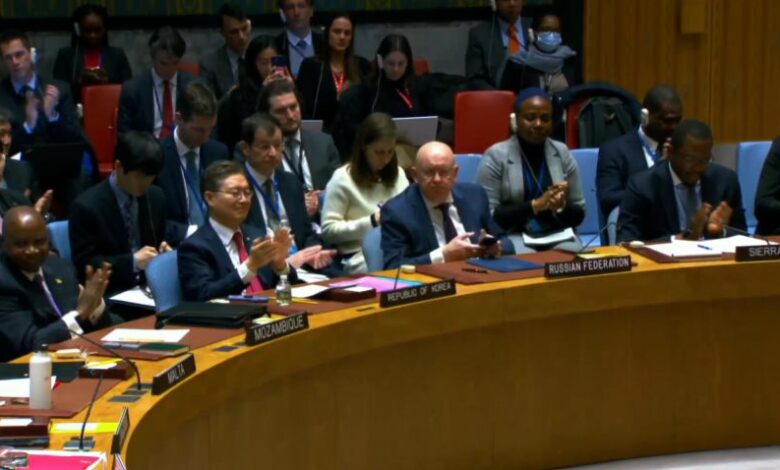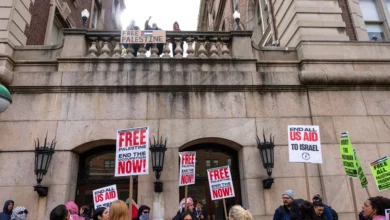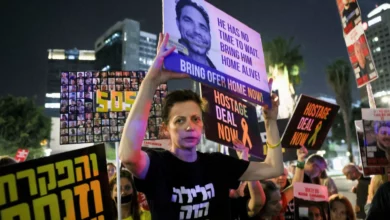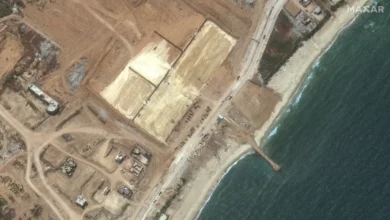
The US decision to abstain on the vote prompted Israel’s Prime Minister Benjamin Netanyahu to cancel a scheduled trip to the US by two of his top advisers, two Israeli officials said.
The US had previously vetoed similar resolutions calling for a ceasefire. Its position evolved last week when on Friday, it put forward a ceasefire resolution tied tied to the release of hostages. That resolution fell when it was vetoed by Russia and China. The US abstention on Monday’s vote allowed the latest resolution to pass, when the other 14 members of the 15-strong council voted yes.
The US Ambassador to the United Nations Linda Thomas-Greenfield said that while the latest resolution included edits requested by the US, Washington could not vote yes because it “did not agree with everything.”
“A ceasefire could have come about months ago if Hamas had been willing to release hostages,” the ambassador said, calling on member states and the Security Council to demand that Hamas “accepts the deal on the table.”
“Any ceasefire must come with the release of all hostages,” she added.
The resolution, put forward by the 10 non-permanent members of the Security Council, demands an immediate ceasefire for the month of Ramadan, the immediate and unconditional release of hostages and “the urgent need to expand the flow” of aid into Gaza.
UN Secretary-General António Guterres said a failure to implement the resolution would be “unforgivable.”
“The Security Council just approved a long-awaited resolution on Gaza, demanding an immediate ceasefire, and the immediate and unconditional release of all hostages. This resolution must be implemented. Failure would be unforgivable,” Guterres wrote on X, previously known as Twitter.
Both Hamas and the Palestinian authority welcomed the resolution, while Israeli Ambassador to the United Nations Gilad Erdan criticized the Security Council for passing a measure that called for a ceasefire “without conditioning it on the release of the hostages.”
“It undermines the efforts to secure their release,” he said at the United Nations.
Israeli Foreign Minister Israel Katz said on X his country would not abide by the resolution.
“The state of Israel will not cease fire,” Katz said. “We will destroy Hamas and continue to fight until the last of the hostages returns home.”
The Biden administration made the choice to abstain rather than veto the UN Security Council resolution over the weekend when they were able to work on changing certain parts of the resolution’s text, according to a senior administration official.
Another source familiar with the matter said that the US had planned to veto, but there were intensive diplomatic efforts to find a compromise that put them in a position to abstain.
Initially the text demanded a permanent ceasefire and did not mention negotiations to release hostages, and the US was able to push for the text to change so that it referenced a lasting ceasefire and included language about the ongoing hostage release efforts, the official said. For those reasons, the US believed that the resolution was consistent with US policy, the official said, a sentiment echoed by US Secretary of State Antony Blinken.
“Because the final text does not have key language we view as essential, notably a condemnation of Hamas, we could not support it. This failure to condemn Hamas is particularly difficult to understand coming days after the world once again witnessed the horrific acts terrorist groups commit,” Blinken said in a statement.
The UN vote on Monday came as tensions grow over a looming Israeli military operation in Gaza’s southern city of Rafah. The US has been calling on Israel to explain how it will protect the 1.4 million Palestinians seeking refuge there ahead of the expected incursion, which the US said “would be a mistake.”
The UN Ambassador of the Palestinian Territories, Riyad Mansour, said the decision was a vote “for life to prevail.”
It has taken six months for the Security Council to demand an immediate ceasefire, and “over 100,000 killed and maimed, two million displaced, and famine for this council to immediately demand an immediate ceasefire,” Riyad said.
A visit canceled
Israel’s national security adviser Tzachi Hanegbi and Ron Dermer, a member of the war cabinet and close adviser to Netanyahu, had been scheduled to travel to Washington on Monday night to discuss the offensive and US alternatives, but the visit was canceled after the vote.
National Security spokesman John Kirby offered a fuller response to Netanyahu’s decision to cancel the delegation, saying the US was disappointed by the decision to cancel the trip.
“We’re very disappointed that they will not be coming to Washington, DC, to allow us to have a fulsome conversation with them about viable alternatives to going in on the ground in Rafah,” he said.
State Department spokesperson Matthew Miller called the cancelation “surprising and unfortunate.”
One US official told CNN that scrapping the visit was an overreaction that most likely reflects Netanyahu’s own domestic political concerns. Netanyahu did not communicate directly with Biden over the decision, and the President has no plans to phone Netanyahu to discuss the matter, the official said.
Separately, Israel agreed to a US proposal on a prisoner-hostage deal, according to CNN analyst Barak Ravid’s reporting on the recent round of talks in Doha. The reported deal could see the release of around 700 Palestinian prisoners, among them 100 serving life sentences for killing Israeli nationals, in exchange for the release of 40 Israeli hostages held by Hamas in Gaza.
However, Hamas said more issues remain unresolved beyond the release of Palestinian prisoners from Israeli jails. Hamas senior officials Basem Naeim told CNN that “Israeli-American media” was adding pressure on the talks.
“For us, the negotiations are not only centric around the prisoner exchange deal,” he said.
“Israel has not agreed to any of (Hamas) requests related to a complete ceasefire, the withdrawal of all forces from the Gaza Strip, even in stages, and the return of all displaced people to their homes,” Naeim said.
CNN’s Kylie Atwood, Jennifer Hansler, Abeer Salman and Alex Marquardt contributed reporting.




